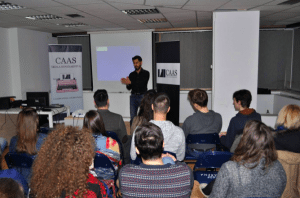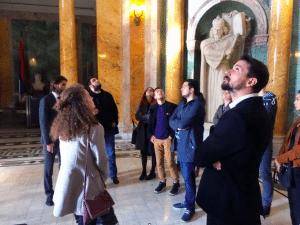Freedom of the press in Serbia: A state of emergency
According to the 2016 World Press Freedom Index measured by Reporters Without Borders, between 2014 to 2016, Serbia dropped 5 places on their global media freedoms top list (from 54th to 59th), and its overall Press Freedom Index worsened from 25.05 to 27.60. As the reasons for Serbia’s decline, this organization noted considerable financial and editorial pressures being put on the media, organized public attacks against the journalists critical of the government, as well as frequent arbitrary financial and administrative inspections aimed at those media that are considered “hostile”.
The causes of the aforementioned situation are diverse, and range from the overall Serbian political system and its communist heritage, to the lack of information on this topic in the public, as well as the overall lack of institutional control. The communist monopoly of the state in the sector of media services was ended in the 1990s with the introduction of a multiparty system which brought more than a decade of relative pluralism of ideas and strengthened the culture of public debates. During the post-communist transition, the Serbian media sector was significantly liberalized and opposition leaning media organizations quickly entered the mainstream during the 2000s.
However, after 2014 and prime minister Vučić’s ascension to power, the situation worsened considerably. A series of organized purges against the “hostile” media left an empty space for the shaping of the tightly government controlled media market Serbia has today. In order for the repression to take its current form, multiple steps were undertaken by Vučić’s regime. By canceling major independent political shows, and effectively declining the rights of the critical members of the opposition and the press to participate in the public discussions, the regime reserved the public media space almost exclusively for the members of its party and the coalition around it, as well as for various previously unknown experts and political analysts whose analysis rarely went beyond unconditional praise of the successes of Vučić’s government.
Consequentially, the only remaining example of relatively independent and responsible journalism can be found on communication channels which either do not depend on the government provided frequencies and licenses, or are simply almost impossible to fully censor, which is the case with internet. In these cases, alternative, indirect methods of censorship are employed, namely implicit calls for public lynching and labeling of the independent journalists as “traitors” and “foreign mercenaries”. Unfortunately, incidents like this have become an almost daily phenomenon.
Actions taken by pro-liberty groups in Serbia
In order to address the aforementioned issues and aid the handful of independent and critical media organizations in Serbia, Center for Anti-Authoritarian Studies envisioned and several ambitious initiatives have seen the light since its foundation in 2015. With its aim of promoting and protecting the unrestricted freedom of expression and empowering young journalists and artists to excel at their profession while promoting values of personal freedom and responsibility, CAAS organized several educational programs for students of journalism and libertarian activists. After a 4-day intensive educational program Investigative Journalism 101 realized in May 2015, where 16 carefully selected students of journalism had the opportunity to learn about journalist ethics and investigative techniques from the experts from Serbian Center for Investigative Journalism (CINS), as well as its follow up that focused on interviewing techniques in December 2015, CAAS decided to organize a much more ambitious, semester long School of Journalism.
This program was realized between the 5th of October and 21st of December 2016 in cooperation with European Students for Liberty and Atlas Network and featured three months of weekly lectures and workshops during which our twenty participants learned about investigative and economic journalism, public presentation and values of freedom and responsibility from notable Serbian media experts such are journalists from Criminal and Corruption Investigative Network (KRIK), N1 TV (CNN affiliate) and others. During the program, the participants also had the opportunity to visit the Serbian Parliament and the offices of KRIK and discuss the freedom of the press with Serbian MPs, as well as witness how real investigative stories are made. The program was successfully finished on the 21st of December 2016 when our participants had the opportunity to listen to lectures by SFL’s European Programs Director, Aleksandar Kokotović and the acclaimed Mexican journalist and libertarian activist Julio Alejandro (founder of Humanitarian Blockchain).

Julio Alejandro (ESFL) teaches our participants about his experience as an investigative journalist (21.12.2016.)
Apart from attending the lessons and workshops, our participants also had the opportunity to apply their newly acquired skills in practice by writing 4 original investigative stories guided by an experienced journalist and editor from daily newspaper Blic, Tamara Spajić, as well as the journalists from KRIK. Investigative work done on one the stories impressed KRIK enough for them to give three of our participants internships at their office. All of the stories are currently work in progress and are expected to be finished before March 2017 when their findings will be presented on the upcoming Media Matters conference which is aimed at bringing the general public closer to the problem of media censorship in Serbia through several panel discussions during which media experts, journalists and politicians will share their views on this topic as well as discuss the optimal strategies for remedying it.
For updates on the upcoming Media Matters conference, the second generation of CAAS School of Journalism, or other future projects and initiatives by Center for Anti-Authoritarian Studies, feel free to visit our website www.caas.rs or contact us directly via email at [email protected].
Ratko Nikolić is a student of sociology and a libertarian activist, with several years of experience in running non-profit organizations like SFL Serbia and Legalize.rs. He is the current president of the Center for Anti-Authoritarian Studies, a Serbian libertarian organization focusing on promoting values of liberty in the fields of art and culture. Ratko is a former executive board member and regional director for former Yugoslavia at European Students for Liberty.
This piece solely expresses the opinion of the author and not necessarily the organization as a whole. European Students For Liberty is committed to facilitating a broad dialogue for liberty, representing a variety of opinions. If you’re a student interested in presenting your perspective on this blog, please contact [email protected] for more information. Header picture source: Flickr.

